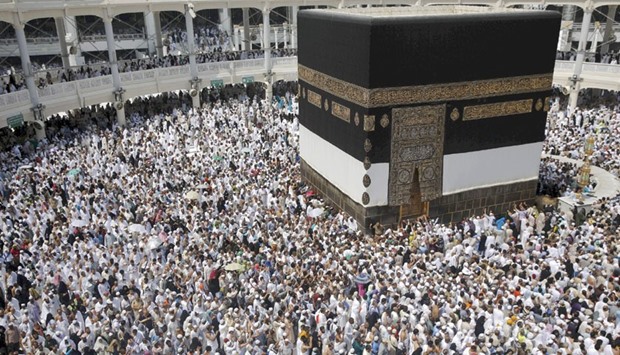Inside the Ka’aba: Usamah bin Zaid radhiallahu anhu narrated that the Prophet sallallaahu ‘alaihi wa sallam, when he entered the Ka’aba, made du’a to Allah at all its sides [Muslim]. In another hadith, Abdullah bin Umar said, “I saw Allah’s Messenger entering the Ka’aba. He, Usamah bin Zaid, Bilal and ‘Uthman bin Talha and they (locked the door) on themselves. So when they opened it, I was the first enter and I met Bilal and asked him, “Did Allah’s Messenger pray in it?” He said, ‘Yes’, he prayed between the two Yamani pillars” [Bukhari and Muslim]. However, it might be difficult for many of people to enter the Ka’aba. In such a situation, it is sufficient for a person to make Du’a inside the wall which is surrounding the Ka’aba from one side as this is considered a part of the Ka’aba. The evidence is in the hadith where ‘Aishah radhiallahu anha asked Allah’s Messenger about the Jidar (wall) – ‘Is it part of the Ka’aba? He said, ‘Yes’. She said, ‘Why did they not enter it into the Ka’aba?’ He said. ‘Your people lacked sufficient funding’ [Bukhari and Muslim].
At Safa and Marwah: Jabir narrated in his lengthy hadith about the pilgrimage (Haj) of the Messenger of Allah ‘....then he walked out from the door heading towards As-Safa, and when he got closer to the Safa, he read “Verily, As-Safa and Al-Marwah are of the symbols of Allah” {Al-Baqarah, 158} “I begin with that which Allah began with” so he began with As-Safa and went up on it till he sighted the Ka’aba, he faced the Qiblah and then proclaimed the oneness of Allah, made Takbeer and said, “La Ilaha Illallah Wahdahu La Shareeka Lah. Ladul-Mulk wa Lahul-Hamd, Wa-Huwa ‘Ala Kulli Shay-in Qadeer. La Ilaha Illallahu Whadah, Anajaza Wa’dah, Wa Nasara ‘Abdah, Wa Hazamal Ahzaaba Wahdah” then he made du’a between the two, repeating what he said three times..’ In the hadith it is also mentioned that ‘he did the same actions at Al-Marwah as he did at As-Safaa’ [Muslim]. Therefore, it is a Sunnah to make du’a to Allah at As-Safa and at Al-Marwah during ‘Umrah or Haj as these are counted among the places where Du’a is accepted.
At Arafah: During the Haj, and particularly on the day of ‘Arafah, one must try to make du’a to Allah subhanahu wa ta’ala as much as he can because a Du’a made on this day is the best Du’a and it is more likely to be accepted as explained in the following hadith. ‘Amru bin Shu’aib narrated from his father who, in turn, narrated from his father that the Prophet sallallaahu ‘alaihi wa sallam said, “The best Du’a is the Du’a (made) on the day of ‘Arafah” [Tirmithi]
The people from whom Du’a is accepted
Anyone who abides by the conditions of Du’a, refrains from the reasons of its rejection, implements its manners and seeks the times and places of acceptance will be among those whose Du’a will be accepted. The Sunnah of the Prophet sallallaahu ‘alaihi wa sallam has also shown us specific types of people whose Du’a are especially accepted by Allah subhanahu wa ta’ala.
A person’s Du’a for his Muslim brother: A Muslim must always try to remember his brothers during Du’a because such a Du’a is accepted by Allah. Whatever we ask for out brother, we will be granted likewise. Um-Ad-Dardaa narrated that the Prophet used to say, “A Muslim’s Du’a his brother in his absence is accepted. There is an angel (assigned) close to his head, whenever he supplicates for his brother that which is good, the assigned angel says, Ameen, you will be granted similarly” [Muslim]
Du’a of an oppressed person: On many occasions, the Prophet sallallaahu ‘alaihi wa sallam used to warn his companions from the Du’a of an oppressed person as it will certainly by answered. An example of this is the incident when Allah’s Messenger sent Mu’adh bin Jabal to Yemen. He gave him many instructions among which he said “And beware of an oppressed person’s Du’a for there is no shield between it and Allah” [Bukhari].
A father’s Du’a against his child: When in anger, parents must avoid making Du’a against their children as it might be answered, and that they will regret the Du’a later. A father’s Du’a for or against his children is answered as was mentioned by the Prophet sallallaahu ‘alaihi wa sallam in the hadith narrated by Abu Hurairah “Three (types) of du’a are answered, without doubt – an oppressed person’s Du’a, a travelling person’s Du’a and a father’s Du’a for his son” [Tirmithi, Abu Dawood]. In another narration collected by Ahmed and Tirmithi, the Prophet said “a father’s Du’a against his son”.
A fasting persons Du’a: Abu Hurairah narrated that Allah’s Messenger said, “Three (types) of Du’a are not rejected – a fasting person’s till he breaks fast, a just ruler’s and an oppressed person’s...” [Tirmithi]. In another collected by Tirmithi, it has been reported that when a person invokes Allah when he is about to break his fast, his invocation is not rejected.
A pious child’s Du’a for the deceased parents: Children remain a benefit even when a person has passed away. When they make du’a to Allah requesting pardon for their deceased parents, their du’a is accepted. The one whose children forget after death, is certainly a loser. Abu Hurairah narrated that Allah’s Messenger said, “When a person dies, all rewards from deeds are terminated except from three – a continuing charity, (‘Ilm) knowledge from which benefit is (still) gained, and a pious child who is making du’a for him” [Muslim].

